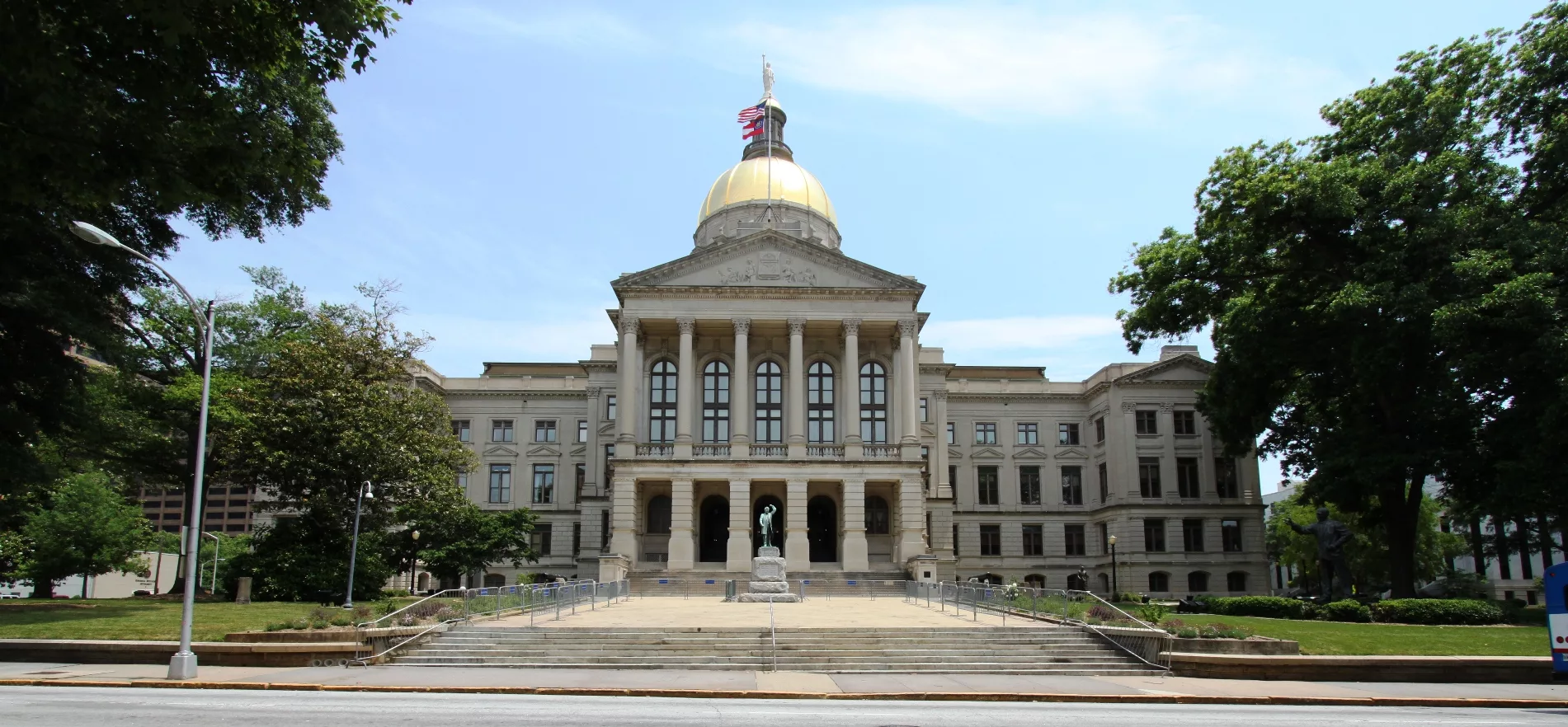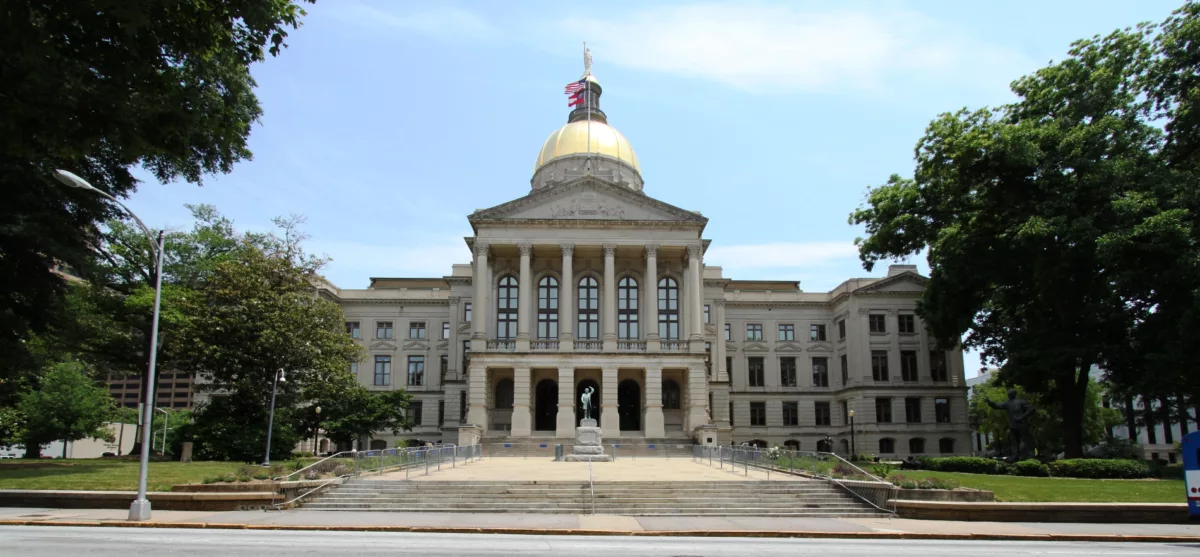Newsletter
Georgia’s Backslide Into a Carceral Hellscape
A wave of bills threatens to channel more people toward incarceration, mete out longer prison terms, and limit prosecutors’ discretion.


Georgia’s Backslide Into a Carceral Hellscape
by Anna Simonton
Georgia’s justice movements have attracted worldwide attention in recent months, amid clashes between activists and law enforcement in Atlanta over the proposed construction of Cop City, a nearly $90 million police training facility that would demolish acres of forest viewed as crucial to the area’s climate resiliency. While the state’s clampdown has led to a series of explosive headlines, including the police killing of a protester in January, the continued commitment to Cop City is just one way Georgia—and the city of Atlanta—are veering off a more promising path to justice reform.
Throughout most of the state’s history, Georgia has had a reputation for some of the nation’s most punitive laws, inhumane prison conditions, and heinous police brutality. But over the past decade, grassroots organizing by impacted communities and bipartisan legislative efforts had begun to move the state away from its nearly exclusive reliance on mass policing and incarceration.
Now, as Georgia’s 2023 legislative session comes to a close, a wave of bills threatens a return to that dark history by channeling more people toward incarceration, meting out longer prison terms, and limiting prosecutors’ discretion.
Both branches of the Legislature have passed a measure that would instate harsher penalties for certain “street gang” offenses, a dubious label that invites prosecutorial overreach. The bill imposes a mandatory minimum five-year prison sentence and prohibits probation. It also includes a separate provision that bars release on recognizance to all defendants who have been convicted of bail jumping or received a bench warrant within the past five years.
Another piece of legislation would require cash bail for certain misdemeanors, including obstruction of a law enforcement officer and unlawful assembly. The bill would undo parts of a 2018 state law and comes as Atlanta’s localized bail reform measure is facing renewed backlash from local officials.
Measures aimed at cracking down on protesters include making “rioting” a felony and expanding the Georgia Bureau of Investigations’ power to pursue domestic terrorism charges. State lawmakers are also seeking to make it easier to discipline or remove from office prosecutors who implement reform-oriented policies, such as declining to prosecute certain charges. That bill passed this week and is headed to the governor’s desk.
In Atlanta, local officials are backtracking as well. Mayor Andre Dickens has abandoned plans to close the city jail and repurpose it into an “Equity Center.” Instead, the city is leasing the building to neighboring Fulton County in an effort to alleviate overcrowding that has caused dangerous jail conditions. Advocates argue that the solution to the problem shouldn’t be to make more space for more detainees, but instead to release hundreds of people who have not been formally charged or are locked up for minor offenses.
Fulton County is meanwhile also laying the groundwork for a much bigger jail expansion: A study the county commissioned proposes building a new, $2 billion jail that would hold more than 6,000 people, nearly quadrupling the current jail’s capacity. The study acknowledges that legal system reforms could reduce the need for so many jail beds. But county officials are moving ahead on the expansion anyway, all while showing hostility toward alternatives that could keep people out of jail in the first place. County commissioners recently considered cutting funding for a Pre-Arrest Diversion (PAD) program, which connects people facing arrest with support services instead of incarceration, but backpedaled in response to public outcry. The PAD program is one of several initiatives, shaped from years of organizing by impacted communities, that face an uncertain future as political winds shift direction.
In 2013, Georgia organizers founded the nonprofit Racial Justice Action Center, which helped launch and operate Women on the Rise, a group led by formerly incarcerated women, and the Solutions Not Punishment Collaborative (SNaP Co), a project that formed to fight a “banishment” ordinance targeting sex workers, many of whom were trans.
Over the next seven years, the coalition won numerous policy changes, from reclassifying marijuana as a non-arrestable offense in Atlanta to a “ban the box” measure that removed questions about criminal history from state job applications. In 2019, advocates successfully campaigned for plans to shut down the Atlanta City Detention Center and appoint a task force to come up with a new, equity-focused use for the building.
These groups were also instrumental in establishing the PAD program, and they worked with organizations like Southerners On New Ground and the Southern Center for Human Rights to pass Atlanta’s cash bond reform. On the heels of these victories, Marilynn Winn, co-founder of Women on the Rise, said Atlanta was “becoming a city that chooses services not sentences, solutions not punishments.”
There were positive developments at the state level too. Georgia is among a handful of red states that have embraced some criminal justice reforms over the past decade. Former Governor Nathan Deal, a Republican who was in office from 2011 to 2019, established the Georgia Council on Criminal Justice Reform, which worked on sentencing reforms, expanding parole eligibility, and ramping up “accountability” courts that offer alternatives to incarceration. These changes fell short in some ways—studies have found little evidence that drug courts ultimately reduce participants’ chances of incarceration, for example. But they marked a meaningful turn away from the tough-on-crime era. During Deal’s tenure, Georgia saw a seven percent drop in its prison incarceration rate, while the jail incarceration rate plunged by 19 percent.
Those trends are now moving in reverse. Georgia’s prison and jail populations have been steadily climbing since hitting record lows in 2020, when the COVID-19 pandemic prompted a string of releases. Conditions in state prisons are a living nightmare, warranting two simultaneous investigations by the Department of Justice. Atlanta-area jails are literal death traps that completely flaunt oversight and accountability.
The bills under consideration in the state legislature threaten to accelerate mass incarceration if passed into law, which the current Republican governor, Brian Kemp, seems to anticipate: His 2023 budget proposal allocates $600 million for prisons to purchase and construct new facilities. And the reversal of political support for criminal legal reform in Atlanta, long seen as a progressive bastion resisting the conservative bent of statewide politics, only stands to hasten this regression.
But the fate of these reforms isn’t fully sealed just yet. Atlanta’s Stop Cop City movement shows no signs of abating. Justice advocates are meanwhile working at the state level to defeat tough-on-crime bills before the end of the legislative session at midnight tonight. And if organizers have proven anything over the past decade it’s that another way is possible, and it’s worth fighting for.
ICYMI — from The Appeal
How do two young men, aged 19 and 20, end up facing mandatory sentences of 43 and 50 years for a crime in which nobody was killed? Under Washington law, their juvenile records led to automatic enhancements. Chelsea Moore and Chris Blackwell explain.
Anti-trans bills are increasingly seeking to criminalize basic affirmations of trans existence. Some measures put parents in the impossible position of having to risk life-altering punishment simply to support their children, writes Adam Rhodes.
In the news
From 2018 through 2022, at least 866 kids under 18 were shot in domestic violence incidents, and 621 of them died. Three times as many children were shot in domestic violence-related incidents than in school shootings during that time period. [Jennifer Mascia / The Trace]
The Department of Homeland Security was created 20 years ago in the wake of the 9/11 attacks and has cost $1.4 trillion dollars of taxpayer money. Throughout its existence, it has “targeted and criminalized Muslim, Black, brown, and immigrant communities under the guise of homeland security.’” [Azadeh Shahshahani and Setareh Ghandehari / The Nation]
Sheriff’s deputies and hospital workers pinned down aspiring musician Irvo Otieno for 11 minutes, killing him. At the time, he was hospitalized at a psychiatric facility in Virginia. [Democracy Now]
Chicago police have increasingly focused on arresting people for illegal gun possession, even as they make fewer arrests in cases involving actual shootings. Between 2010 and 2022, more than 80 percent of the people arrested for gun possession are Black. [Lakeidra Chavis and Geoff Hing / The Marshall Project]
Officers at the Travis County Jail shoved Karen McGee, a 71-year-old deaf woman, against a wall and stripped off her clothes, and a jailer broke her arm. She had been arrested on suspicion of trespassing after she asked a ticket agent if she could change her flight. She was jailed for three days. [Brant Bingamon / The Austin Chronicle]
That’s all for this week. As always, feel free to leave us some feedback, and if you want to invest in the future of The Appeal, donate here.
